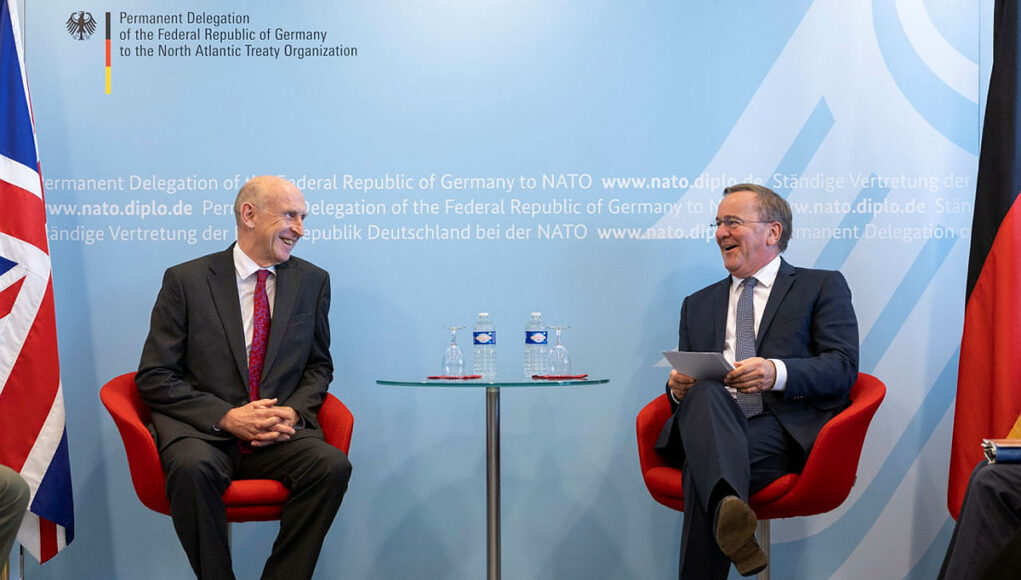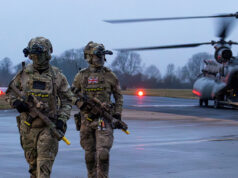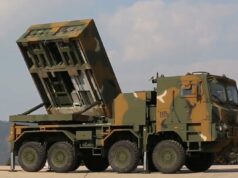Two of Europe’s largest defence companies have announced significant investments in the UK defence industry, following the signing of the landmark Trinity House Agreement between the UK and Germany.
The agreement, signed in London, strengthens ties between the two countries’ armed forces and defence industries, marking a new era of collaboration in European security and economic growth.
Helsing, one of Europe’s fastest-growing defence companies, revealed plans to invest £350 million in UK-based AI technology over the next five years. This investment aims to accelerate the deployment of AI-enabled systems at an unprecedented scale, enhancing the UK’s capabilities in advanced defence technology.
Rheinmetall, a major German defence manufacturer, also announced it will build an artillery gun barrel factory in the UK, supporting over 400 jobs and contributing nearly half a billion pounds to the UK economy over the next decade. The new facility will use British steel, supplied by Sheffield Forgemasters, and will be the first time the UK has produced artillery gun barrels in ten years, with production set to begin in 2027.
Defence Secretary John Healey MP welcomed the investments, stating, “These significant new investments from Helsing and Rheinmetall are a hugely welcome boost to the UK defence industry. It shows how our landmark UK-Germany defence agreement can help drive our defence industries forward, creating highly-skilled jobs and boosting economic growth.”
He added, “From traditional weapons manufacturing to the capabilities of the future, today’s investments by two of Europe’s largest defence companies demonstrate the renewed confidence of investors in the UK defence industrial base.”
The investments are part of a broader effort to enhance European defence cooperation. The Trinity House Agreement includes key projects such as joint development of new long-range strike weapons, expanded training and exercises between the UK and German armies on NATO’s eastern flank, and periodic operations of German P8 aircraft from RAF Lossiemouth to bolster security in the North Atlantic.
Helsing’s investment will also support critical projects outlined in the agreement, including efforts to assist Ukraine and digitise underwater surveillance to protect vital infrastructure.
Co-Founder and Co-CEO of Helsing, Dr Gundbert Scherf, highlighted the urgency of meeting common defence challenges, stating, “Meeting common threats will only be achieved with a shared sense of urgency and a tech industrial base to match this with delivery at speed and scale. Now we’re doubling down with a multi-year commitment to invest at least £350m in the UK to maximise its national strengths.”
Rheinmetall, which already has a significant presence in the UK through its production of military vehicles such as the Challenger 3 tank and Boxer armoured vehicles, sees the new gun barrel facility as a forward-thinking step. Armin Papperger, CEO and Chairman of Rheinmetall AG, remarked, “Rheinmetall’s investment in the gun hall reflects a forward-looking approach to innovation, collaboration, and national defence. It ensures the UK remains a leader in developing and manufacturing defence technologies that safeguard both national and global security.”
With these major investments and the signing of the Trinity House Agreement, the UK and Germany are securing substantial economic and industrial benefits for the future.














Well it’s better than U.K companies being bought out by US private equity firms. They have a habit of asset stripping them to the bone and then destroying what’s left.
German companies tend by decent employers and it isn’t like we don’t own some very large and profitable German Companies.
Your probably right . And I see rheinmetal most likely getting one foot in the door for future artilery contracts , I think boxer vehicle artilery already agreed in principle for uk so this is another step forward for that upcoming contract and future contracts including possible exports . On the whole getting closer with germany for army vehicles, particularly the medium heavy stuff a decent strategy .
Yes a little depressing that Germany is charging to in to save (re establish more like) uk capabilities we stupidly allowed to decline and fall but it s what it is and you are right this is the sort of investment that is beneficial to Britain, adds jobs and capabilities and at least gives uk companies like SFM to gain business supporting them. As you say we naively allow US companies in under the similar heading of ‘investing in the economy’ when apart from the initial payout very often over time actually damages the uk economy, tax income, capabilities, loss of IP and jobs. It’s about time we differentiated the differences in the headline term ‘investment in the economy’. As we found recently in my location a Chinese Investment Company offered to ‘invest’ in the building of much needed homes as long as they had 3 mths grace in selling those homes to foreign markets, is not the sort of investment we need. Thankfully it was refused.
I listen to Ferrari and his market analyst Buick,at 07.40 every week day,I haven’t heard about this,but it’s good news,it’s probably worth double that to the British economy.
It would be nice if they talked up the government and what good it’s doing,but pigs fly.
Irs really no different the reason why US buy UK defence companies and Germany is setting ip here is to ultimately to profit from the the government in other words you and I was we fund the government or more specifically the UK private sector that doesn’t rely on government contracts.
smart move by the new gov. We need far more of this strategic bilateralism, and forging a closer relationship with Europe’s now biggest defence spender is no bad thing at all.
I hope they’ve been shown something we’re not privy to around forthcoming budgets which gives them a great IRR. It’s a long shot but here’s hoping
Before you guys get excited! Few years ago before the wars I saw German strategy makers say to their government post Brexit we must anchor ⚓ Britain closer to us so we gain more influence over them.. especially militarily so they become not a competitor. Now it’s materialising all it seems. They said through the EU they likely would be more skeptical but less so if it’s through us.
I think the UK through bad planning and not by choice , gave up being a competitor in medium to heavy vehicles 20 plus years ago . I think there is an acceptance that maybe best leave tanks , artillery, ifv to the mainlanders allowing uk to focus on Naval and all things in the Air like planes drones missiles and satellites. On the whole I think in 5yrs time uk land army will have a much better strategy and some decent vehicles , as long as ww3 don’t get their first 🙂
Role specialisation has never been a stated component of UK Defence stratgey – we (try to) do everything…even if our Land contribution is relatively small these days. If we really were leaving tanks, artillery etc to the mainlanders we would not be building CR3 and Ajax….or declaring an armoured division to NATO.
i assumed they meant the uk decided to leave building land vehicles to the continentals, which has had a disastrous effect on replacing the aging fleet, rather than leave operating land vehicles to them entirely.
Personally I don’t think there’s any master plan at play, simply complacency because of a lack of any meaningful independent accountability.
Yes if reluctant I agree with you. Alternative buses left a long time ago taking our own capabilities with it through neglect. The biggest hope now is that these investments might encourage Bae to stay invested in the land warfare business if there is opportunity to expand products, exports and profit. But if not at least we have a British based if not UK owned sector to work with, not sure what design and development opportunities that will bring.
And also use British Steel to manufacture the
goods.
Well that can be interpreted almost endlessly considering what your point of view is beforehand, at least based on the information you provide. Considering concerns about a disinterested US any worthwhile European Govt or business would want to keep Britain anchored to European security with close links in cooperative projects as we are all too small to successfully compete in many spheres in the World. It’s a point of view I fundamentally share if we are to put up a u tied front against Russia, China or as we now see even NK and Iran potentially. Not ideal we know but seems to be the best bad solution and due to our geographical location rather more reliable than being tied to a suspect Govt across the pond, of which sees us only as an entity to be exploited whatever the cost to us. Our IP started being absorbed by them in the War and to a greater or lesser degree has been ever since simply by absorbing our businesses or political brute fore and effective bribery and threat far too often in an unequal special relationship. That will only get worse under Trump for all his trumpeting of his Scottish mother.
It’s odd how we quickly dismiss that we can’t compete alone yet South Korea has in he last 30 years developed a very competitive arms industry. And getting good export succes. Korea GDP is about 60% of ours. And whilst it spend more as % it spend far less in $ but still creates advanced defence products like the K9 and the KF21.
Now if the “Tempest” came into play . Just a thought.
As the World Parliament of Peace President elect and my Nigerian American wife Kate Grace Druzhinin GOLIK ZAGURSKY THOMAS GARCIA we commend British Empire government and Admiralty alongside the German military Intelligence corporations for having signed this extremely important TRINITY HOUSE AGREEMENT.Kanzler Scholtz and our King Charles III should be taken as an example of how much such alliances in the heart of Europe at war would mean now that Putin seems to ignore my warning and invitations to sit at the table in Moscow and discuss peace in Ukraine,not the protracted scamming of his warfare with no end in sight.I order that German cruise missiles Taurus alongside British Storm shadows be used immediately on the Central periphery of Moscow and Ryazan region of Russia which constitute a major power concentration of their Soviet TU 95 bombers aviation. Rybnoye city, alongside Dyaguilevo underground tunnels of the strategic military airport must be rased to the ground .God bless America and Israel and Britain and France and Germany.We will win this time ,I have no doubt of that.God save our King Charles III and illumine His Majesty to guide us all to victory and peace
I worked for MAN when thier military truck division became part of the Rhienmetall family in 2010, and at the time Armin Papperber was head of the defence division. He always seemed to have a vision to make Rhienmetall the largest defence company in the world. Since then, they have delivered military hardware to Singapore, Australia, New Zealand to name but a few. They are hoping to break into the US market in the near future.
Whatever some may think of the “Germans”, they certainly know what they are trying to achieve, and as ABCRodney says, they are not so much “asset stripers”, more good employers, looking at long term growth rather than making a quick buck.
This can only be good for British industry, and will result in a return to a thriving defence sector in the country.
I worked for Rheinmetall on their Bid for CR2 LEP (now CR3), as UK adviser on Project Management; very smart of them to hire a lot of Brits on short contracts for this back in 2016.
I agree with all you say.
Their involvement in UK Defence seems to have a parallel in the Japanese involvement in the British mass-produced auto industry, which would be dead without such involvement.
Morning Graham ! I can’t help but think of the irony of how it all works out. The U.K Government neglected to replace U.K built Land Systems with new ones, the result is it’s de facto gone. BAe aren’t a charity, the U.K threw them under a bus, the export market was flooded with nearly new kit so they got out of the industry in the U.K.
Meanwhile they moved their focus to the US and are now one of the US Army’s biggest contractors and supplier of Land Systems such as M2/M3, M109, M777 and now the AMPV.
So who can complain when we annihilated our own industry for Germany to then step in and do some business. I’m going to be interested to see where they put the barrel factory I have a funny feeling it may be in Sheffield.
The upcoming SDR seems to be focusing on capability gaps and I just can’t get my head away from us not having a Tracked IFV or SPG. So my Army wish list would be 400 odd Tracked Boxer to supplement the wheeled ones, who knows it may even dawn on someone that Tracked Boxer can carry the RCH155 module.
Oh and the irony is the whole darned lot of Boxer, Ajax, Booker M10 have RR MTU engines in them.
Yes. Not only were AFVs not replaced at an appropriate interval, they mostly were not significantly upgraded. Shocking that no tracked AFVs were ordered for 20 years. Not sure the RN and the RAF would have tolerated that with their major platforms.
The loss of BAE’s Land equipment Industry is also shocking but some respite in their collaboration with Rheinmetall.
I wish I could be delighted at the CR3, Ajax and Boxer programmes but there is plenty to take the shine off.
The parallels between Hapans invest in the UK auto industry are completely different. Japan setup in the UK so it could export into Europe so it was good for the UK and bolstered export revenues. These defence investments will be used to sell to the UK government. Completely different with different consequences for the economy.
The rationale may be different, but my point was that foreign investment enabled a sector to stay vibrant and not die out.
I agree, just sad how we failed to have such a vision. Depressing how Vickers probably our closest comparison with all its history just faded into obscurity or perhaps a once ‘fastest growing’ business like Racal (the description of Helsing reminded me of it) just decided as growth inevitably slowed (or its shareholders decided) to direct itself and sell off to the highest bidder. Rarely if ever, will you see German companies taking that route and I very much doubt Helsing will either. We see selling out as ‘investment in Britain’ at least this is real investment that means something for a change whatever the sadness that we now need foreigners predominantly to do it for us.
just what the present government want to hear.
“Growth”
Just in time for the defence review to suggest half a dozen German SSKs?
So bit of education for Mr Healy. A good investment in the UK is when a foreign company sets up in the UK to export, so foreign money is used to invest, revenue come from the exports and British people benefit from taxation on foreign revenues.
Investment that will.ultimately mean the tax payer will buy the product and profit from revenue made from the British tax payer is sent overseas is not good investment. It’s no different to Tories selling off defence companies.
I’ve posted on here before we see more European designs being made in the UK, the evidence is starting to emerge but was obvious before the electionwith coauthored papers between Healyand is Germancounter psrt. Over the next five years I expect UK to loose more sovereign capability to Europe to ensure we become dependent.
We keep hearing politicians talking about encouraging foreign investors to Britain, why cannot we invest in ourselves, like we used to do, perhaps because we have sold off the family silver to the highest bidder.
Who was it that first designed the Tank? Ruston Hornsby of Lincoln who were engine builders , now owned by a German company scaled right back and not a diesel engine made but German Gas turbines stealing the Ruston Gas Turbine and putting their stamp on it like Rudolph did.
The first Compression Ignition oil engine was manufactured and on the market well before Rudolph Diesel had completed his design that worked, in fact he was trying to run his on coal dust.
The engine should have been called a Stuart Engine, from Herbert Ackroyd Stuart’s design.
Perhaps the young people are taking the easy route and dropping STEM based subjects at school, schools are not encouraging these subjects and universities are more interested in bumbs on seats in any subject such as Football Mgt and Art History and basket weaving.
It is good news that the Germans see our potential, but our own governments of any flavour cannot.
It will be a long time before we are Great Britain again instead of the Disunited Kingdom. We cannot build ships correctly anymore, with the two carriers having shaft alignment problems. So what will the next problems be that’s going to tie the carriers up alongside with a manufacturing fault.
To think we were turning out Corvettes and Destroyers in the heat of war by the dozens, yet in peace we cannot build two carriers without major faults with all the fancy production toys and computers they have today plus all the degrees in Art History these people have.
The term “British steel” is interesting given Forgemasters do not appear to operate a blast furnace. Their website suggests they melt and form and forge and whatever with steel, that’s not quite the same as making steel.
As the name Forgemasters suggests, they Forge and Cast steel components, not make steel from raw materials where a Blast Furnace or an electric arc furnace is required.
On reading the history a blacksmith and his forge started the company from very small beginings. That’s what we did until the carpetbaggers took over , buying up, asset stripping and closing down, selling the land for housing and disapearing.
Looking at the Forgemaster website, I cannot see Gen Z kids working in those conditions, though to see a Gen Z kid working in a meanigfull job will be a first.